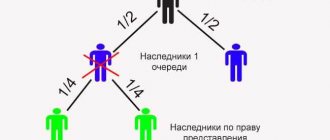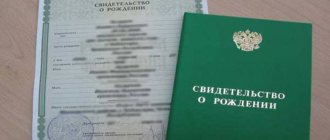Question for an inheritance lawyer:
An 86-year-old husband, 7 days after his wife’s death, used joint money (withdrawn from joint accounts a month before and after his wife’s death) to buy himself an apartment for 10 million rubles. Accordingly, she was not included in the inheritance mass. I, in turn, entered into an inheritance with 1/4 of the share at present.
I will sue. Is it possible to require:
- inclusion of 10 million money in the inheritance mass and allocation of 1/4 shares to me, or
- Is it possible to ask for the inclusion of an apartment in the inheritance estate with the allocation of 1/4, which is more desirable, because won't give you the money???
Read the answer from our lawyer for inheritance cases in Yekaterinburg, and also ask your questions to get professional advice: profitable and on time. Call today!
Is it possible to get money?
Yes, heirs have such an opportunity.
This is due to the fact that although the savings book itself is not valuable, it gives access to the savings of the deceased. Therefore, it may well be considered as a material value, since on its basis it is possible to obtain the savings of the deceased, which will also be part of his inheritance. Receiving funds from the deceased's savings account for the most part follows the standard procedure: it is transferred in the same way as any other funds. However, after the savings book itself falls into the hands of the heir, money will need to be withdrawn from it. In general, the entire process of withdrawing money from the account of a deceased relative will look like this:
- One of the heirs opens the inheritance;
- The notary conducts the inheritance process in the standard manner: notifies relatives, conducts an inventory of property, etc.;
- The notary determines the future holder of the savings book, who will be able to receive money from it;
- The heir receives the necessary package of documents and goes to the bank.
The process is generally quite standard. However, even the smallest mistake in it can cost the heirs dearly. In this regard, we will consider it in more detail.
Opening an inheritance
The distribution of property between the heirs of the deceased begins from the moment one of the heirs submits a document recording the fact of the citizen’s death to a notary. From this day begins the countdown of six months, during which the notary will be obliged to notify all potential heirs that they can participate in the division of property.
It is worth noting an important detail - if the testator had a will, this will not save the notary from the need to open an inheritance and wait six months. This period is given so that all relatives who had the opportunity to participate in the division of property can familiarize themselves with the text of the will and challenge it if necessary.
Managing an inheritance
After opening the inheritance, the notary will begin its management. Everything is simple here. If the deceased did not have a will, then the call to inheritance will begin in the order of legislative priority. Thus, the first applicants for the deceased’s savings book will be his immediate relatives - spouse, parents and children.
If the testator has a will, then the deceased’s savings book will go to the person indicated by the testator himself. Relatives, regardless of the queue, third parties and even an existing organization will be able to receive a savings book. In this case, any of the potential heirs will be able to challenge the will. If his initiative is successful, the will will lose force, and the savings book, along with other valuables, will participate in the distribution of property in the order of legal priority.
Definition of heir
As a rule, if there is a will, there are no disputes over the determination of the heir - he has already been determined by the deceased himself in advance. Therefore, problems can only arise if inheritance takes place in order of priority. The fact is that the notary has the right to divide the money available on the book into equal shares between all representatives of one of the lines of inheritance. However, in practice, this creates a lot of problems - firstly, it will be quite difficult to formalize such an operation and carry it out, and secondly, each of the testators will have to write their own application and go to the bank.
In this regard, in practice the following action is used - all heirs choose among themselves one representative to whom the savings book will be inherited. He undertakes to independently receive the money from the savings account, after which it must be divided equally according to the share of each recipient. This saves time and effort, allowing you to tackle more complex inheritance issues.
Receiving the money
So, all the issues have been settled, the disputes have been settled, the legal period for entering into inheritance has passed and the savings book has found a new owner. All that remains is to get money from the savings book. It's very easy to do. First, prepare your documents. You will need:
- Conclusion from a notary on the transfer of inheritance;
- The savings book itself;
- Your account number for transferring funds;
- Death certificate;
- Your ID.
With these documents you will need to go to the bank and write a corresponding application. All that remains for you after this is to transfer the package of documents and receive money into your personal account.
There is no money for a funeral, where to go?
If there is no money at all for the funeral or there is no opportunity to come to organize the funeral, or the deceased has no relatives, then, according to Article 12 of the Law “On Burial and Funeral Affairs,” a specialized funeral service takes over the burial responsibilities. Here's what their responsibilities include:
- preparation of documents necessary for burial;
- vestment of the body;
- provision of a coffin;
- transportation of the deceased to the cemetery (crematorium);
- burial.
First, the internal affairs bodies must find out the identity of the deceased, after which, within 3 days from the moment the cause of death is established, the special service carries out its functions. If the identity is not established, then burial can take up to several months.
You can find out which organization performs the role of a specialized service in the administration of the locality. Usually a Resolution with the necessary information is published on the website. Example:
By law, every citizen is provided with a free burial place. But there is a nuance here - a specialized funeral service only works with unclaimed bodies . In order for the body to become unclaimed, you must either write a refusal statement or simply not pick up the body from the morgue for 7 days. The corpses of homeless people most often become unclaimed, as well as the bodies of those who were found without documents and could not be identified, for example, a person left for another region to work, he was robbed, his personal belongings were taken and his life was taken.
However, an unclaimed body can lie in the morgue for several months, or even a year. In January and February 2021, unclaimed bodies in Moscow could not be buried due to the fact that not a single funeral home submitted an application for an auction from the Bureau of Forensic Medicine, which significantly reduced the cost of one burial under the contract. In 2016–2017, the cost of one burial cost the Bureau 10.7 thousand rubles, in 2021 - 12.8 thousand rubles, and in 2021 only 6.6 thousand rubles. (calculated by RBC based on data from the government procurement website). It becomes unprofitable for funeral services to deal with unclaimed bodies.
Depending on the region, unclaimed bodies are buried differently. Somewhere, a separate grave, a simple coffin, is allocated for each body. Somewhere they can bury several bodies in one common grave, but somewhere they cremate them.
This is what a cemetery plot with unclaimed bodies in Moscow looks like. Each grave is assigned a number, and if the person’s identity is eventually established, then his body can be found and exhumed using the number:
The unclaimed body will rest in this cemetery for five years. Relatives have that much time for exhumation and reburial, if they still find the money. After 5 years, the body will be dug up and taken to the Nikolo-Arkhangelskoye cemetery in Balashikha. There the body will be cremated and the ashes of the unclaimed body will be stored on a specially designated shelf for another year. If relatives do not take the remains this year, then the ashes will forever be placed in the grave of unclaimed ashes.
What is social burial
Social burial is a limited list of services provided by the state free of charge. The list of services includes:
- coffin upholstered with fabric, slippers, blanket;
- transportation of the deceased in a hearse to the burial place;
- digging a grave;
- installation of a registration plate with the name of the deceased and years of life (the cross and plaque are not included in the price);
- cremation and delivery of an urn with ashes.
The monument, decorations for the grave, even the mound of the grave are not included in the social package. Therefore, if you want to bury it with dignity, you will need to spend extra money.
The only additional service is the installation of a tombstone costing 3,200 for deceased disabled pensioners.
Receiving a bank deposit from a deceased relative. General points
Receiving a deposit under law, will and testamentary disposition occurs differently. But there are general rules of succession that must be observed, regardless of the basis of inheritance:
Performing the actions necessary to accept the inheritance. Without this, even the property bequeathed to the heir cannot become his property. It will pass to other persons - successors by law or to the state. Notarization of inheritance rights. It is impossible to exclude this clause and replace it with actual legal succession in the case of a deposit. Contacting a notary at the last registered place of residence of the deceased
USEFUL INFORMATION: Alimony after 18 years, new law
In the case when it is unknown or is located abroad of the Russian Federation, the address of the testator’s real estate (the most valuable object) is taken into account, and in the absence of real estate, the location of the most expensive movable material wealth (for example, a branch of a bank that stores the largest cash deposit) . Obtaining a certificate of inheritance. Without this document, the bank will refuse to issue a deposit. Compliance with legal deadlines
An application to a notary must be made within 6 months from the date of death of the testator or from the day when the priority heir (first priority or appointed by the testator) refused to receive the contribution. If the successors with the priority right of inheritance have not accepted the inheritance after six months, applicants of the next priority or those nominated in the will can do so instead over the next three months. A deadline missed for valid reasons may be reinstated. To do this, the heir must ask permission from the others who formalized the inheritance of the successors, or go to court. By accepting a bank deposit, the testator also accepts the rest of the property due to him, as well as obligations in the form of outstanding debts of the deceased, testamentary refusal or assignment, which may be assigned by the testator in the will. It is impossible to refuse any one object or obligation, just as it is impossible to selectively accept an inherited account if it is included in the inheritance share along with other property. Funds bequeathed to several persons without indicating the amount of shares due to them are inherited by them equally, in the same way as by heirs of the same line according to the law.
Reimbursement of funeral expenses through deposits in a banking institution
A separate situation arises with the issue of funerals and receiving money from the deceased’s savings book. A decent funeral for the deceased is a troublesome and financially expensive matter. An article of the Civil Code of Russia implies compensation for expenses associated with the death of the testator. Features of receiving funds depend on the rules that apply in a particular institution.
If we are talking about such purposes, then you can use bank funds stored in the personal accounts and deposits of the deceased citizen. You can receive finance without waiting for 6 months after the opening of the inheritance. Thanks to such opportunities, not only heirs and close relatives, but also any persons who have taken upon themselves the organization of the funeral event can receive money.
To withdraw funds from an account at a banking institution, you need to contact a notary where the inheritance was opened. The specialist will issue a resolution to compensate for the finances that people receive to organize a funeral and pay for funeral services. The person indicated in the document has the right to contact the bank where the deceased citizen’s money is kept. It is imperative to prepare a banking agreement or savings book, because a notary’s decree alone will not be enough.
Prepare a death certificate: original and copy. Documents confirming the degree of relationship are needed if a close relative withdraws savings. You will also need paper confirming your identity.
Important! The finances issued by the bank to pay for funeral services are limited to certain amounts. It is necessary to clarify this point in advance, because the rules vary in different institutions. Heirs who were identified after the death of the bank account owner, as well as people involved in funeral issues, can withdraw funds from the deceased’s savings book
To receive finances that were kept in the accounts of a deceased Russian citizen, both need to contact a notary. Heirs can receive money after opening a special inheritance case
Heirs who were identified after the death of the bank account owner, as well as people involved in funeral matters, can withdraw funds from the deceased’s savings book. To receive finances that were kept in the accounts of a deceased Russian citizen, both need to contact a notary. Heirs can receive money after opening a special inheritance case.
Who is entitled to funeral benefits?
Funeral benefits are available to relatives of three categories of deceased:
- Pensioners.
- Military personnel.
- Officially employed persons.
Each of the categories should be considered in more detail. They have their own nuances that affect the circumstances of the payment and its size.
Pensioners
Pensioners are considered people who have reached retirement age (in 2021, 61 years and 56 years for men and women, respectively, until 2028 it will gradually increase to 65/60 years) and are on state support. They can live purely on social benefits, or they can continue to work, in which case the mechanism for claiming funeral benefits is different. In the first case, payment for the funeral is requested from the Pension Fund, in the second - from the employer. The state guarantees this assistance if the funeral of the pensioner is provided by another person.
Military personnel
If the deceased is a military serviceman, then you need to keep in mind that these are not only people who serve in the armed forces and have a military profession. Also included in this category are:
- called up for military training;
- firefighters;
- employed in the structure of the Ministry of Internal Affairs;
- customs officers;
- FSIN employees.
If an employee dies, all expenses are borne by the state. Expenses mean:
Survivor's pension - who is entitled to it, the amount and how to get it + answers to readers' questions
- paperwork;
- transportation to the morgue;
- morgue services;
- provision and delivery of funeral accessories;
- burial of the deceased (including his delivery to the burial place);
- cremation of the deceased (including his delivery to the cremation site).
This applies not only to active employees and military retirees, but also to WWII veterans. Relatives or acquaintances must only inform the military registration and enlistment office or other authority about the death of a serviceman. If the burial has already been carried out by relatives, compensation is due, otherwise the burial will be organized by the Ministry of Defense.
If the deceased belonged to one of these categories, then he is entitled to an honorary funeral:
- had at least 20 years of service in the Armed Forces or Navy of the Russian Federation;
- awarded the titles Hero of the Soviet Union or Hero of the Russian Federation;
- was a full holder of the Order of Glory;
- was a participant in wars and a combat veteran;
- held government positions in the Russian Federation;
- had certain services to the Motherland.
In these cases, there will definitely be mourners at the funeral: orchestra, escort, outfit, guard.
For residents of Moscow and St. Petersburg, the maximum amount of compensation for a military funeral cannot exceed 27,016 rubles; in other regions it cannot exceed 19,511 rubles.
Relatives of a deceased military man can also receive compensation for the costs of installing a tombstone. Its amount cannot be more than 33,721 rubles.
Officially working
If a person was employed at the time of death, the payment is made through the Social Insurance Fund (FSS). This is where contributions were paid on behalf of the employee, so the actual burial would be paid for through the deceased's regular payments. It is enough to contact the employer to receive the amount stipulated by law; we will talk about this further.
Is it possible to withdraw money from the savings account of a deceased relative?
Receiving money under a will A will involves expressing the last will of the deceased. You should know that not only a notarized document has legal force. Wills certified by the head of the institution where the testator spent his last days are also equivalent to it.
Let's look at other situations that you may encounter in order to receive an inheritance from the bank.
Please note that this practice is used not only in Sberbank, but also in other financial institutions. If the heir does not know about the deposit, the heirs need to know that the duties of bank employees do not include searching for applicants for the inheritance
Any things, property objects and rights can be inherited. Deposits left by the testator in banking institutions are also subject to inclusion in the inheritance mass.
USEFUL INFORMATION: In what cases do second-stage heirs inherit?
The order is completed by the seventh circle of legal successors, which includes the stepmother, stepfather, as well as the stepson and stepdaughter of the deceased. Rights between turns are transferred if the candidates of the previous round refused to join, died before the opening of the inheritance, or did not show any interest in inheritance at all.
If such papers are not available, you can contact Sberbank (central office) and write an application to search for a deposit. This procedure is possible only after acceptance of the inheritance and entry into legal rights
Please note that the information you are interested in can be obtained by a notary by sending an official request. This is a fairly common practice
Sometimes compensation for deposits and the amount of the account are so meager that they are of no interest to the heirs. In this case, the heirs are allowed to renounce their claims.
The options for receiving savings described above have one essential rule - in all cases, money is issued after 6 months after the death of its owner. The legal successors will not be able to dispose of them before the designated period.
Inheritance is a complex of property (movable and immovable), rights and obligations received through inheritance. Funds placed in bank accounts and deposits of the deceased testator also belong to the estate. In this article we will tell you in detail how to get money from the savings book of a deceased relative.
Show your passport and documents proving your relationship with the testator. These documents include a birth certificate and marriage certificate.
How to get money from a savings book after the death of a depositor under a will In a situation where the heirs have a will in their hands, which clearly states the share of the inheritance of each of them, it is much easier for them to exercise the right to inherit funds held in accounts in Sberbank. The heirs need to contact a notary to draw up a document accepting the inheritance.
In particular, if you want to withdraw funds from a savings book, then present the original and a photocopy of the book itself.
How to get money from a savings book after the death of a depositor under a will In a situation where the heirs have a will in their hands, which clearly states the share of the inheritance of each of them, it is much easier for them to exercise the right to inherit funds held in accounts in Sberbank. The heirs need to contact a notary to draw up a document accepting the inheritance.
After the death of their parents, children and relatives resolve issues of inheritance and return of material assets from the accounts of the deceased. To understand how to get a deposit in Sberbank for a deceased parent, you need to find out whether the deceased has drawn up a will or testamentary disposition.
Do I need to pay tax
In accordance with the provisions of the legislation of the Russian Federation, property (movable and immovable) received by inheritance is not subject to tax. Money from the account of a deceased relative comes to the full disposal of the successor - he has the right to withdraw savings and close the deposit or extend it.
When it comes to savings accounts that depreciated in the early 90s, based on a 2010 decree of the Government of the Russian Federation, owners of such deposits can expect compensation for deposits before 1991. If a deceased relative has a depreciated deposit, the successor can receive savings under the following conditions:
- The savings book was opened in Sberbank.
- The depositor was born before 1945 and the amount deposited in 1991 will be tripled.
- If the account holder was born between 1946 and 1991, the amount of savings will double.
Each case has its own nuances. If disputes arise, it is recommended to consult a notary or a professional lawyer.
Is it possible to get money?
Yes, heirs have such an opportunity. This is due to the fact that although the savings book itself is not valuable, it gives access to the savings of the deceased. Therefore, it may well be considered as a material value, since on its basis it is possible to obtain the savings of the deceased, which will also be part of his inheritance.
Receiving funds from the deceased's savings account for the most part follows the standard procedure: it is transferred in the same way as any other funds. However, after the savings book itself falls into the hands of the heir, money will need to be withdrawn from it. In general, the entire process of withdrawing money from the account of a deceased relative will look like this:
- One of the heirs opens the inheritance;
- The notary conducts the inheritance process in the standard manner: notifies relatives, conducts an inventory of property, etc.;
- The notary determines the future holder of the savings book, who will be able to receive money from it;
- The heir receives the necessary package of documents and goes to the bank.
The process is generally quite standard. However, even the smallest mistake in it can cost the heirs dearly. In this regard, we will consider it in more detail.
Opening an inheritance
The distribution of property between the heirs of the deceased begins from the moment one of the heirs submits a document recording the fact of the citizen’s death to a notary. From this day begins the countdown of six months, during which the notary will be obliged to notify all potential heirs that they can participate in the division of property.
It is worth noting an important detail - if the testator had a will, this will not save the notary from the need to open an inheritance and wait six months. This period is given so that all relatives who had the opportunity to participate in the division of property can familiarize themselves with the text of the will and challenge it if necessary.
Managing an inheritance
After opening the inheritance, the notary will begin its management. Everything is simple here. If the deceased did not have a will, then the call to inheritance will begin in the order of legislative priority. Thus, the first applicants for the deceased’s savings book will be his immediate relatives - spouse, parents and children.
USEFUL INFORMATION: Degrees of kinship in inheritance: order of acceptance of property by law
If the testator has a will, then the deceased’s savings book will go to the person indicated by the testator himself. Relatives, regardless of the queue, third parties and even an existing organization will be able to receive a savings book. In this case, any of the potential heirs will be able to challenge the will. If his initiative is successful, the will will lose force, and the savings book, along with other valuables, will participate in the distribution of property in the order of legal priority.
Definition of heir
As a rule, if there is a will, there are no disputes over the determination of the heir - he has already been determined by the deceased himself in advance. Therefore, problems can only arise if inheritance takes place in order of priority. The fact is that the notary has the right to divide the money available on the book into equal shares between all representatives of one of the lines of inheritance. However, in practice, this creates a lot of problems - firstly, it will be quite difficult to formalize such an operation and carry it out, and secondly, each of the testators will have to write their own application and go to the bank.
In this regard, in practice the following action is used - all heirs choose among themselves one representative to whom the savings book will be inherited. He undertakes to independently receive the money from the savings account, after which it must be divided equally according to the share of each recipient. This saves time and effort, allowing you to tackle more complex inheritance issues.
Receiving the money
So, all the issues have been settled, the disputes have been settled, the legal period for entering into inheritance has passed and the savings book has found a new owner. All that remains is to get money from the savings book. It's very easy to do. First, prepare your documents. You will need:
- Conclusion from a notary on the transfer of inheritance;
- The savings book itself;
- Your account number for transferring funds;
- Death certificate;
- Your ID.
With these documents you will need to go to the bank and write a corresponding application. All that remains for you after this is to transfer the package of documents and receive money into your personal account.
Inheritance options
You can receive the property of the deceased no earlier than six months after death. No matter who the testator's heir is, no matter what the difficult financial situation. He will be able to receive money from the deceased’s deposit only when he receives the approval of a notary.
Exception: if the money in the deceased’s account needs to be spent on burial. More on this below.
The term does not change for all categories of heirs:
- Those who receive property by law;
- Those to whom the will applies;
- Those who were dependent on the deceased.
Checking whether the deceased has a passbook
The availability of funds in savings accounts can be determined if their details are indicated in the testamentary document. Detailed information about the amounts and location of funds should be provided here.
If there is no will, then the following is done to determine the accounts of the deceased:
- Contacting a notary in order to identify the existence of agreements on savings books and deposits of a deceased relative.
- Sending a formal request to those banks in which the deceased person may have had accounts. Done by a notary. To simplify this procedure, Sberbank has a simple and transparent scheme of cooperation with notary offices.
It should be understood that banks do not independently search for heirs of deposits. Therefore, the search for savings must be carried out by the heirs themselves. If the deceased's accounts are not used for more than three years from the date of his death, then all funds will go to the state.
Compensation for old deposits
Features of receiving
Let's consider who can receive the lost money:
- clients who did not have time to issue a refund;
- having Russian citizenship and currently residing on its territory;
- citizens born before 1991 (before 1945 - 3 times the amount, others - 2 times);
- their heirs;
- heirs who spent money on funeral services for those who died in 2001-2021 will receive 6 thousand rubles, if the balance in 1991 was more than 400 rubles;
- the same category receives 15 times more if the balance was less than the specified amount.
A special system for calculating the amount of deposit refunds was developed and approved.
The following categories cannot issue a refund:
- citizens of former Soviet republics;
- heirs are not citizens of the Russian Federation;
- received compensation;
- the account was opened after June 20, 1991;
- presence of a closed balance sheet from 06/20/1991 to 12/31/1991.
What does that require
Compensation for deposits made in Soviet times at Sberbank will take place in 2021 in a certain order. The applicant applies to any branch of a banking institution, since during the collapse of the USSR there was a significant reformation of the previous banking system. You must first submit an application about your decision to receive funds and appear with a passport and passbook. If the interests of the owner of the book are represented by another citizen, then he will need to present documents confirming this right (power of attorney certified by a notary). If the investor is undergoing treatment, the power of attorney is certified by the management of the medical institution.
Today, people who did not do so earlier continue to receive payments on deposits.







